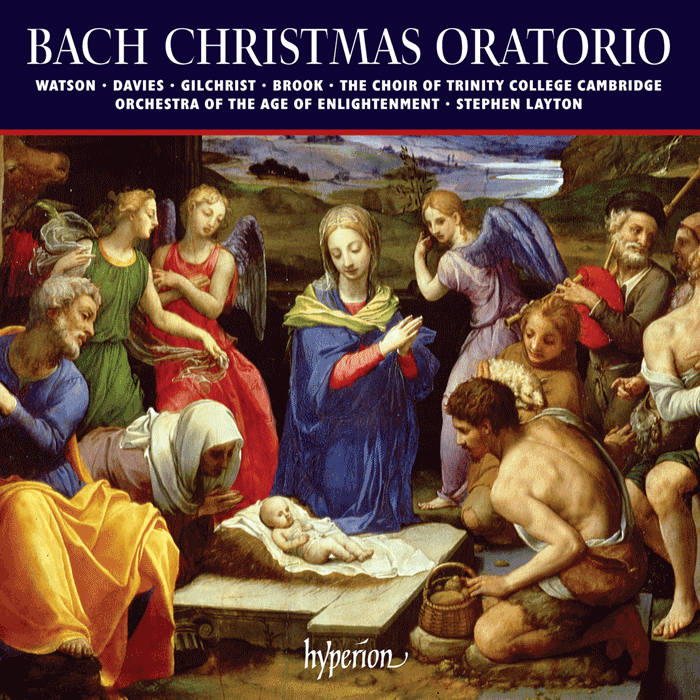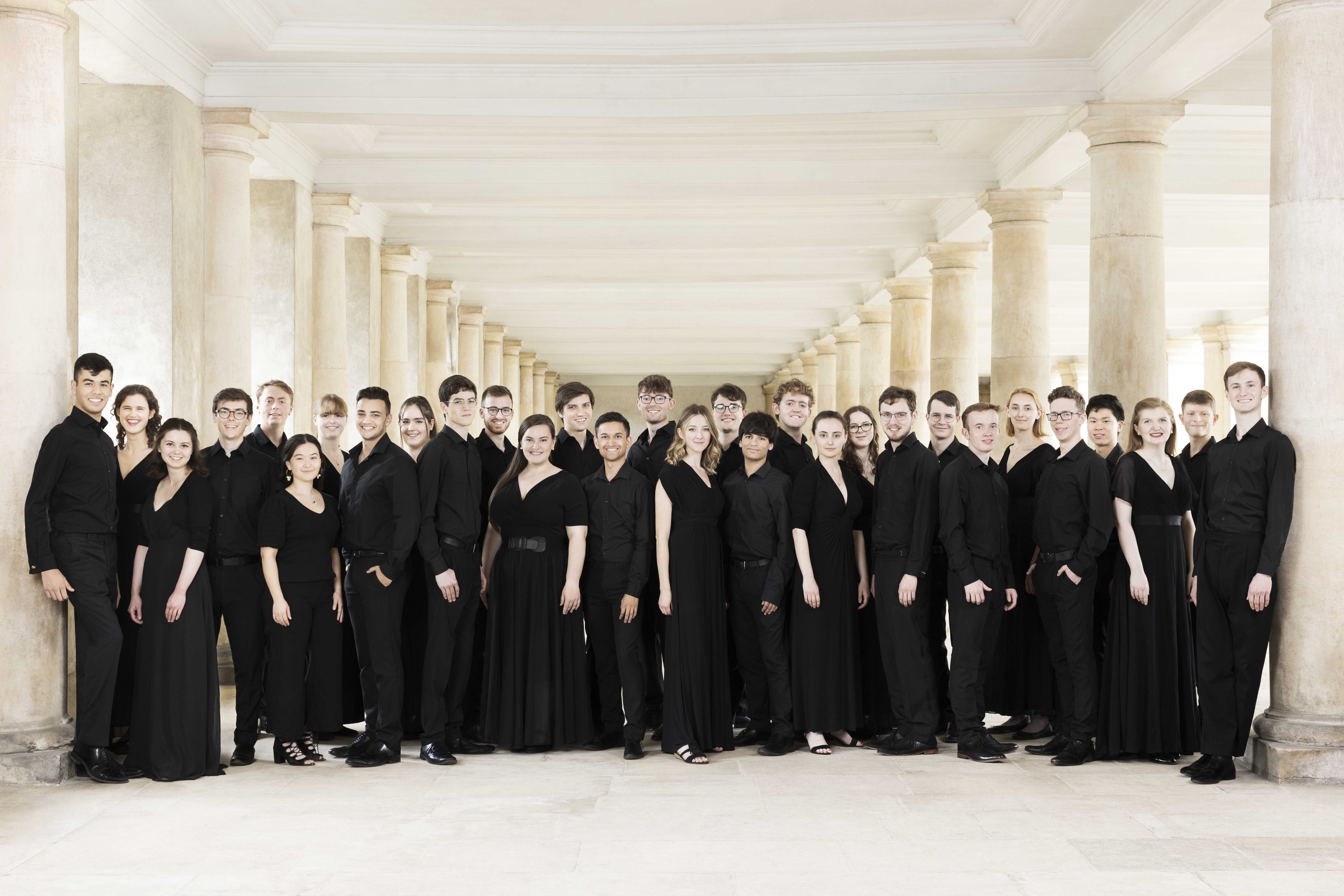Bach - Christmas Oratorio - Music Web International
> See recording details...Earlier this year I was very taken with Stephen Layton’s recording of Bach’s St John Passion. That recording was made with his other choir, Polyphony, and the Orchestra of the Age of Enlightenment. Now Layton has recorded another of Bach’s great choral works, the Christmas Oratorio. I fancy this new recording, though set down in Cambridge, is linked to Layton’s work as director of the annual pre-Christmas celebrations at St. John’s, Smith Square, London and, in fact, he’ll be performing Christmas Oratorio there on 22 December as part of the 28th Christmas Festival. That performance will involve all the artists on this recording with the exception of Matthew Brook who will be replaced by Neal Davies.
This isn’t the first work with Christmas associations that Layton has recorded for Hyperion. I greatly admired his 2008 recording of Messiah with Polyphony and the Britten Sinfonia. For that recording modern instruments were used though the performance was clearly informed by period performance disciplines. This new Bach set involves period instruments and I’ll say at the outset that the playing of the OAE brings great distinction to this recording. The ensemble playing is alert and stylish – and sympathetic too – while the obbligato parts are, without exception, superbly delivered.
The Choir of Trinity College is similarly on very fine form. Though the membership of student choirs has an inevitable annual ‘churn’ this must be pretty much the identical choir that I enjoyed hearing so much at the Cheltenham Festival a few months after this recording was made. The choir made a splendid impression in Cheltenham, as they do here. Right from the opening chorus of Cantata I one notes clarity and vigour in their singing as well as evident engagement with and enjoyment of the music they have to sing. They are equally good elsewhere: spirited, for example, in ‘Ehre sei Gott in der Höhe’ (Cantata II) and crisp and incisive in ‘Ehre sei dir, Gott, gesungen’ at the start of Cantata V. I also liked very much the grace and expressiveness they bring to ‘Fallt mit Danken, fallt mit Loben’, the opening chorus of Cantata IV. Equally admirable here is Stephen Layton’s pacing, which seems to me to be well-nigh ideal, imparting a delightful lilt to the music – and the pair of horns make a gratifying addition to the instrumental palette.
So, this set ticks all the boxes so far in terms of chorus and orchestra; what of the soloists?
I have a preference for a female alto in this work; perhaps it’s on account of the nature of the words that Bach sets. However, Iestyn Davies swiftly banishes such a prejudice. He was an outstanding member of Layton’s solo teams in both the St John Passion and Messiah recordings and once again his singing gives great pleasure here. I like his tasteful ornamentation in the da capo section of ‘Bereite dich, Zion’ (Cantata I) and he gives a delectable account of the heavenly ‘Schlafe, mein Liebster, genieβe der Ruh’’ (Cantata II). For years my yardstick version of Christmas Oratorio has been John Eliot Gardiner’s 1987 recording. In this particular aria Gardiner is appreciably swifter than Layton, taking 9:20 against Layton’s 10:47. In many ways I still like Gardiner’s approach to the aria but it is a lullaby, after all and that’s how it sounds from Davies and Layton. Everything Davies does in this performance is classy, including his work in recitative: sample, for example, his expressive way with the recitative in Cantata V, ‘Wo ist der neugeborne König des Jüden?’
Katherine Watson has virtually nothing to do before Cantata IV other than a brief appearance as an Angel. On her first significant appearance, in the ‘Echo’ aria, she makes a very favourable impression, singing engagingly and with winning tone. The echo effect is well managed, too; Rachel Ambrose Evans, a choir member, sings her little interjections very nicely and the distancing on her voice is well captured by the engineers. Later on, Miss Watson gives a very good account of ‘Nur ein Wink’ and is very involving in the preceding recitative (Cantata VI). Overall, I enjoyed her contribution very much.
Matthew Brook, an experienced Bach singer, not least with the Monteverdi Choir, is on fine form. He’s clear and authoritative in ‘Groβer Herr, o starker König’ (Cantata I), brilliantly supported by David Blackadders’s silvery trumpet. In Cantata V I admired his excellent legato line and firm, rounded tone in ‘Erleucht auch meine finstre Sinnen’. Here, as elsewhere, his words are clearly enunciated – a virtue shared by his fellow soloists – and that enunciation is also in evidence in his very good recitative work.
James Gilchrist is an admirable choice as the Evangelist. He’s a seasoned Bach singer and I well recall his several contributions to Gardiner’s Bach Cantata Pilgrimage. Indeed, Gilchrist supplied what was for me one of the true high water mark moments of the entire project with his spellbinding singing of the affecting aria ‘Bleibt, ihr Engel, bleibt bei mir!’ in Cantata BWV19. The Evangelist’s role inChristmas Oratorio requires a very different approach to the dramatic, urgent style that’s appropriate to so much of the narration in the Passions. Here the singer is telling a gentler, kinder story, Gilchrist is fully attuned to the style and to the music and I found his narration beautifully nuanced, sensitive and characterful. The sheer sound of his voice is very pleasing. He’s also conspicuously successful in the arias, not least in the tongue-twisting ‘Ich will nur dir zu Ehren leben’ (Cantata IV) in which he’s partnered by two sprightly violins. Gilchrist is nimble and sure-footed in the aria’s demanding passagework. I also enjoyed his lively rendition of ‘Nun mögt ihr stolzen Feinde schreken’ (Cantata VI).
Presiding over everything and moulding all these excellent performances into a cohesive whole is Stephen Layton. I find his direction highly convincing. Just once or twice I wondered about a tempo selection – the very first chorale in Cantata I is a little too steady for my taste – but time and again I felt that his pacing of a chorale or an aria was ideally judged. He ensures that the celebratory side of this wonderful work is given full value yet he’s equally successful with the crucial reflective side of things. I was moved by the performance but also I enjoyed it immensely and that’s how it should be.
It only remains to be said that engineer David Hinitt has produced an excellent recording. The acoustic of the Trinity College Chapel has been used most sympathetically and the recording combines ambience and clarity in a most pleasing way. Nicholas Anderson’s booklet essay is first rate.
Has the Christmas story ever been better or more compellingly set to music than by Bach? Possibly, though offhand I can’t think of a work that improves upon Bach’s inspirational setting. This stylish and committed performance is one that renews again one’s awe at the genius of Bach. I know Stephen Layton’s new recording will give me great pleasure this Christmas and in the future and I hope it will do the same for you.
John Quinn

Hyperion Records CDA68031/2
